
Ever wonder what it really takes to transform a spark of inspiration into a fully realized manga series? Today, we’re diving into the world of amateur mangaka, Vincent Cven, the creator of Puppet Blood Manga.
Raised in Nigeria and heavily influenced by titles like Naruto and Tokyo Ghoul, Vincent defied the odds—limited resources, cultural skepticism, and creative self-doubts—to carve out a space for his own dark fantasy epic.
In this exclusive interview, we’ll uncover how he shapes his craft, masters digital tools on his phone with just a fingertip, navigates the business side of manga creation, and ultimately breathes life into characters who balance on the razor’s edge between good and evil.
Becoming a Mangaka
Can you tell us a little bit about yourself and where you’re from?
Hi, I’m Vincent Cven, also known as Cvensart for my artwork and Cvenswrites for my written works. As the creator of Puppet Blood Manga, I’m excited to share my journey.
What inspired you to become a mangaka? Was there a specific moment or work that sparked your passion for manga?
My love for manga began with Naruto, followed by Fairy Tail and Bleach. Masashi Kishimoto’s (Naruto) and Sui Ishida’s (Tokyo Ghoul) works sparked my passion.
Their complex storytelling and world-building inspired me to create my own unique narrative.
But as for what inspired me to create the story puppet blood manga, I will say it’s those real life witch doll horror movies like Chucky, and few of them that I can barely remember.
I believe that will be something original when introducing a witch doll as a protagonist who is both good and evil in manga since there’s no popular manga that has such kind of protagonist.
How did your childhood or upbringing influence your decision to pursue storytelling in manga?
Growing up in Nigeria was challenging for pursuing manga. With limited resources and discouragement from others, I explored other interests like music and mechanical work.
However, my love for manga persisted, driven by my creativity and early writing experiences since age 8.


What motivates you to keep pursuing your goals, both personally and professionally?
Growing up, I developed a fascination with Japanese culture, anime, and manga. This passion drove me to pursue a career in manga creation.
What’s something people would be surprised to learn about you?
One surprising fact might be the significance of the witch doll in my story, also the fact that I draw the manga with my finger and on my phone.
Many may not find it surprising that I’m self-taught in manga and storytelling, given the rise of online resources.

Are there any specific artists, manga series, or other creative mediums that heavily influence your work?
When creating Puppet Blood Manga, I draw inspiration from various sources:
Japanese Manga and Anime: Series like Tokyo Ghoul, DandaDan and Junjito influence my storytelling and art. It inspired me to make my art better.
Dark Fantasy and Horror: Genres like Gothic fiction, dark fantasy, and horror influence the manga’s atmosphere and themes.
Real-Life Experiences: Personal struggles, relationships, and observations shape character motivations and emotional depth.
What motivates you to keep going when you’re struggling with a project or feeling uninspired?
As the creator of Puppet Blood, I’ve faced challenges and I think the passion of storytelling and being creative is what keeps motivating me.
I want to be able to make a living out of this because I feel this is what I’m born for so with this in my mind I feel it keep motivating me. Support from readers, seeing how the engagement is increasing on puppet blood manga site is also motivates me a lot.
It makes me feel like wow, I think this goal is achievable if I can just keep doing and pushing.
I really love the idea of movie, working in animation studio, music, voice acting, someday getting to just sit and watch my own show so yeah, all these really motivates me to keep on.

What do you hope your readers take away from your stories?
I hope readers take away a sense of empathy, understanding, and inspiration from Puppet Blood Manga. My goal is to delve into identity, community and, encouraging readers to reflect on their own values and struggles.
I hope to Inspire resilience through the characters’ struggles and triumphs, I want readers to find strength in perseverance and hope in the face of adversity and help readers understand and relate to diverse perspectives, backgrounds, and experiences, promoting tolerance and compassion.
Growing up I faced challenges like self-doubt, so I want readers to know that their voice matters, Their struggles are valid and their dreams are possible.
Ultimately, I hope Puppet Blood Manga leaves a lasting impact on readers, inspiring them to embrace diversity, pursue their passion and find strength in community
By sharing my story, I hope to create a ripple effect of positivity, inspiring readers to make a difference in their own worlds.
About Puppet Blood manga
Can you tell us a bit about the current story “Puppet blood”? What is the main plot or premise?
Puppet Blood is a dark fantasy manga series that explores the supernatural awakening of an ancient witch doll. The story unfolds after the sudden death of Bun, a young woman from a devout Roman Catholic household, triggering a chain of eerie events.
In the aftermath of their mother’s mysterious death, Benon and his siblings face unimaginable tragedy when their youngest sister falls victim to a sinister plot orchestrated by their uncle. As grief and hardship engulf them, the family’s downward spiral accelerates.
However, the death of their last sister unleashes a malevolent force: an ancient witch doll, rumored to exact judgment upon evil-doers. The doll infiltrates their uncle’s mansion, seeking vengeance.
Benon and his remaining sister, Biki, are imprisoned in an underground cage by their ruthless uncle. But when the witch doll entity descends into their dark confines, their fate takes an eerie turn.

What inspired the central theme or message of your current work? Did it come from personal experience or something else?
The central theme of Puppet Blood revolves around the consequences of playing with forces beyond human control and the exploitation of power. I drew inspiration from various sources, including mythology, few horror movies, my thoughts about the dark side of life, and real-life events.
Personally, I’ve experienced loss and grief, which influenced my exploration of these themes. I wanted to create a story that delves into the darker aspects of human nature and the supernatural.
How did you come up with the idea for this “Puppet blood”? Was it a sudden inspiration or something that developed over time?
While not directly based on personal experiences only, Puppet Blood is influenced by my emotions and observations. I’ve always been fascinated by the unknown and the supernatural. Originally puppet blood was planned to be just 9 chapter Story which was why if you notice the first few chapters pace was very fast.
But as of 2023 the plan changed and I decided to make it a longer series. The witch doll as a protagonist kind was the number one idea that I had to start up the story at the first place. So with time I gradually start going deeper into the story telling.
In fact, I really don’t know much about my characters as of now but the more I look into their background when am writing the script the more I’m learning more about them.
Originally the idea of puppet blood started in 2018, the first Script was around 2020/2021 and then I start to draw the manga in 2022.
Although as of 2023 I decide to improve the artwork because I just learned to take the series too serious and make something big out of it.

Challenges of writing and developing a story
What is the biggest challenge you’ve faced while writing this story, and how have you dealt with it?
One of the biggest challenges was balancing the dark fantasy elements with the emotional depth of the characters. I wanted to create a story that’s both thrilling and emotionally resonant.
To overcome this, I focused on character development, ensuring their motivations and emotions drove the plot. I also researched various storytelling techniques, such as pacing and tension, to maintain a captivating narrative.
Additionally, receiving feedback from readers, few reviewers that I approach and fellow creators helped refine the story.
What kind of journey do you want your readers to experience when they follow the story?
I aim to take readers on a thrilling and emotionally resonant journey, exploring the darker aspects of human nature and the supernatural.
As they follow Benon and Biki’s struggles, I hope readers experience a range of emotions, from fear and anxiety to empathy and compassion.
I want readers to become invested in the characters’ fates and reflect on the consequences of their actions.
I aim to evoke a sense of unease and tension, as readers navigate the dark fantasy world. I also want to inspire empathy and understanding, encouraging readers to consider the complexities of human nature.
Through the story, I hope to explore themes of grief, guilt, and redemption, leaving readers with a lasting impression.

Do you have a clear ending in mind for your current series, or are you letting the story evolve as you write?
While I have a general outline for the story’s progression, I’m allowing the narrative to evolve organically. As I write, new ideas emerge, and characters develop in unexpected ways.
This flexibility enables me to create a more immersive and engaging story. However, I do have a clear vision for the overall story arc and the fate of the main characters.
What role does symbolism or metaphor play in your writing?
Symbolism and metaphor are integral to Puppet Blood, adding depth and complexity to the narrative.
The witch doll, Santana Muñeca, serves as a symbol for the consequences of playing with forces beyond human control.
The underground cage represents the characters’ emotional confinement and the darkness they must confront. These symbols and metaphors invite readers to interpret the story on multiple levels.

Are there hidden layers to your story that readers might not catch at first?
Yes, Puppet Blood contains subtle hints and foreshadowing that might not be immediately apparent. Readers may need to revisit earlier chapters or pay close attention to details to uncover these hidden layers.
For example, the significance of the witch doll’s origins or the true nature of Zuo’s powers might only become clear as the story unfolds.
How has your story evolved from the first draft to where it is now?
Puppet Blood has undergone significant transformations since its inception. Initially, the story focused on Benon and Biki’s harrowing experience in the underground, followed by the witch doll’s intense battle with Zuo’s men.
However, as I delved deeper into the narrative, I found myself drawn to the story of Muun, a pivotal side character. I decided to explore Muun’s backstory to address a crucial question that had been lingering: the circumstances surrounding Morina’s death.
By sharing this part of the story, I aim to add depth to the narrative and provide insight into the characters’ motivations.
Throughout this process, the story’s tone has shifted from a straightforward horror tale to a more complex exploration of family dynamics, religious differences, and the consequences of one’s actions.

Have there been any major changes along the way that surprised even you?
One significant change that surprised me was the evolution of the doctor’s character. Initially, he was intended to be a minor supporting character.
However, as the story progressed, particularly in Chapter 2 of Puppet Blood, his behavior hinted at a deeper connection to Zuo.
The doctor’s fearful reaction to Zuo’s presence in the hospital sparked my curiosity, and as I continued writing, I uncovered more intriguing aspects of his character.
This organic growth has added a rich layer to the narrative, and I’m excited to see how readers respond to the doctor’s complex role in the story.
Business side of manga creation
Marketing your manga
What advice would you give to aspiring mangakas who are just starting out and want to improve their skills?
For aspiring mangakas, I’d advise them to develop a consistent writing and drawing routine. Practice regularly, and don’t be afraid to experiment and try new things.
Study the work of other mangakas, analyze what makes their stories compelling, and learn from their techniques.
They can also join online communities or forums to connect with fellow creators, share your work, and receive constructive feedback. Most importantly, stay passionate and patient – creating a manga is a long-term commitment.
What is the best platform to upload your book for maximum visibility and engagement?
For me, I do say all social media handles, but mostly Instagram, Facebook, Twitter, Tumblr and also Deviant art. I use all of them.
But I personally noticed more engagement and visibility through Instagram story more. Probably that could be as a result of my efforts of approaching few manga influencers who get to share my manga to their audience and after that I start to get more visibility on Instagram more than the others even though I once focus on Facebook posting and ads but still I think Instagram ends up working a lot better unexpectedly for me.
Also about platforms for manga and webcomic to upload for maximum visibility I do say Webtoon is on top for that.
For now Puppet blood chapters is published mainly on Mangaplus creators because it’s a manga kind of art and paneling, but one day I will have to try uploading one of the Puppet blood one shots to Webtoon to keep maximizing the visibility and engagement because I believe in this Story and I will want every eye that’s Interested in the kind of Puppet blood genre to get to know of the story.
How did you approach marketing when you first launched your book? Did you have a specific strategy in mind?
When I first launched Puppet Blood, my marketing strategy focused on building an online presence through social media and engaging with potential readers.
I created a website and profile on Buymeacoffee platform primarily for sharing updates, concept art, and snippets from the story.
I also reached out to few creators, bloggers, and influencers in the manga community on Instagram asking for feedback, making a review post and collaborations for the Puppet blood manga. Online buzz helped spread the word about Puppet Blood, attracting a fan base, although still growing.
Have you experimented with social media marketing? If so, which platforms have been the most successful for you and why?
I’ve experimented with various social media platforms, and Instagram has been the most successful for me. The visual nature of the platform allows me to share engaging artwork, snippets, and behind-the-scenes content that resonates with my audience.
I also use Instagram’s features like Stories and Reels, to diversify my content and connect with readers. Additionally, I’ve found that engaging with my audience through comments, and direct messages helps build a few loyal community around Puppet Blood. We also have a Facebook group for that.

Have you faced any marketing challenges, and how did you overcome them?
Yes, I’ve faced several marketing challenges while promoting Puppet Blood. One of the biggest hurdles was standing out in a crowded online space and reaching my target audience.
To overcome this, I focused on building an online presence through social media, engaging with my audience, and collaborating with fellow creators.
I also experimented with different marketing strategies, such as offering exclusive content, and utilizing paid advertising. By being adaptable and willing to try new approaches, I was able to increase visibility and attract new readers to Puppet Blood.
Mangaka skills and challengers
What is the most important skill or technique you think every aspiring mangaka should master?
I believe that every aspiring mangaka should master the art of storytelling. Developing a compelling narrative with well-rounded characters, plot twists, and pacing is crucial for capturing and retaining readers’ attention.
To achieve this, it’s essential to practice writing, experiment with different storytelling techniques, and study the work of other mangakas.
Additionally, learning to receive and Consider feedback from readers and peers can help refine your storytelling skills.

What was the biggest challenge you faced when you first started creating manga, and how did you overcome it?
One of the biggest challenges I faced when starting to create manga was self-doubt and fear of failure. I struggled to develop my art style and writing voice, and I worried that my work wouldn’t be well-received.
To overcome this, I focused on building my skills and getting better at artwork through consistent practice. I also joined online communities and forums, where I connected with fellow creators who shared similar struggles and offered valuable advice.
By being patient, persistent, and open to learning, I was able to overcome my initial doubts and develop the confidence to share my work with others.
Manga and self publishing
What tools or software did you use to create your manga?
I know a lot of artist are use to Photoshop and Clipastudio paint when working on their manga but for me, I personally use Medibang paint and I have been using it for 13+ years now for drawing before I start to use it for my manga.
There are awesome pen tools in the software already like the pen, pencil, Brush, G-pen e.t.c Also I always draw with my finger on my phone screen while drawing the manga on Medibang paint. I have once tried using stylus pen but then, using my finger to draw seems to be more better for me.

How did you decide how much to charge for your manga?
Since I’m self-publishing Puppet Blood, I had to research to find the right price point. I considered factors like the complexity of the art and inking, production costs, target audience, and the pricing strategies of similar manga titles.
I decided to offer my manga at a competitive price point, balancing affordability with the need to recoup my investment.

What advice would you give to someone thinking about self-publishing their manga?
My advice for someone thinking about self-publishing their manga would be to thoroughly research the process, prepare for a significant time commitment, and be open to learning and adapting.
Self-publishing requires handling all aspects of production, marketing, and distribution, so it’s essential to be proactive and flexible. Building a strong online presence, engaging with your audience, and continually improving your craft are also crucial for success.
What was it like using Amazon to self-publish your manga? Was it easy to use?
Using Amazon to self-publish Puppet Blood was a relatively smooth experience. The platform’s interface is user-friendly, and the guidelines for formatting and content are clear.
I found the process of uploading my manga, setting the price, and choosing distribution channels to be straightforward.
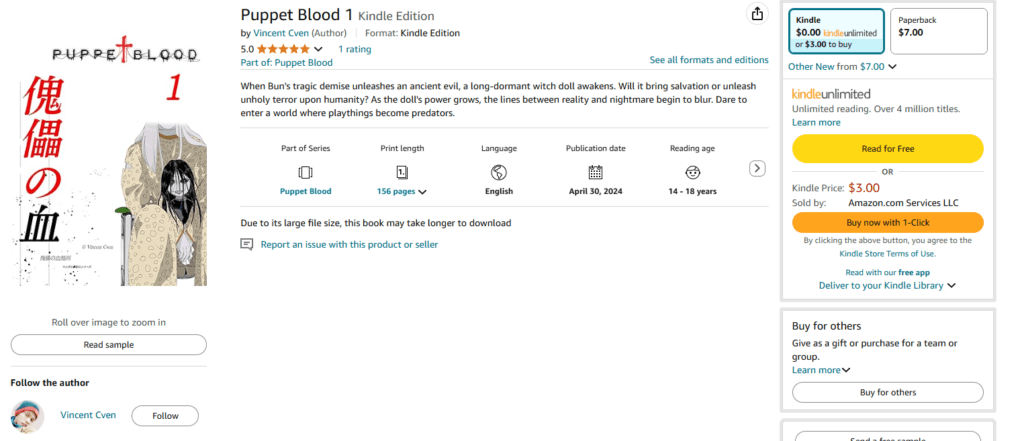
How did you make sure your manga fit Amazon’s rules and formats?
To ensure my manga fit Amazon’s rules and formats, I carefully reviewed their requirements and made adjustments as needed.
I checked the file format, resolution, and content guidelines to guarantee compliance. Amazon’s online resources and support team were helpful in addressing any questions or concerns I had.
Did you have any problems publishing on Amazon, and how did you fix them?
I encountered some minor issues during the publishing process, mainly related to formatting and content guidelines.
To resolve these problems, I carefully reviewed Amazon’s requirements, made the necessary adjustments, and re-submitted my manga.

How did you get people to notice your manga on Amazon?
To get people to notice Puppet Blood on Amazon, I employed a multi-faceted approach. I leveraged social media platforms like Instagram, Twitter, and Facebook to share updates, artwork, and snippets from the story.
I also participated in online communities, forums, and groups dedicated to manga and comics, sharing my work and engaging with potential readers.
Additionally, I utilized Amazon’s promotional tools, such as Kindle Unlimited and Countdown Deals, to increase visibility and attract new readers.
Is there anything you wish you’d done differently when publishing your manga?
In retrospect, I wish I had invested more time in building my online presence and audience before publishing Puppet Blood.
Establishing a strong foundation of readers and followers would have helped me generate more buzz and excitement around the manga’s release.
How has publishing your manga on Amazon helped you connect with readers?
Publishing Puppet Blood on Amazon has been instrumental in connecting me with readers worldwide. The platform’s vast customer base and discoverability features have allowed me to reach a broader audience.
I’ve received valuable feedback, and messages from their authors community, which have helped me refine my craft and understand what resonates with my audience.
Amazon’s analytics tools have also provided insights into reader behavior and preferences, enabling me to make informed decisions about future content and marketing strategies.

Thanks for reading
Thank you for reading Vincent’s journey and the passion that fueled Puppet Blood Manga. It has been cool hearing him talk about overcoming challenges — like sketching entire pages on the screen of his phone using the tip of his finger — and crafting stories that fuse horror, culture, and personal growth.
If you want to follow his journey, peek behind his curtain, or support his developing craft, make sure to subscribe to his social accounts, Facebook and Instagram.
If you liked this interview and want to hear more from the creative minds behind one-of-a-kind stories, you can find more interviews like this one, check out the interview with the author of Black Noblesse.
We’re grateful for your support as we help amplify these passionate voices, so if you’d like to support our platform, feel free to subscribe to our social media channels.
Thanks again for reading!

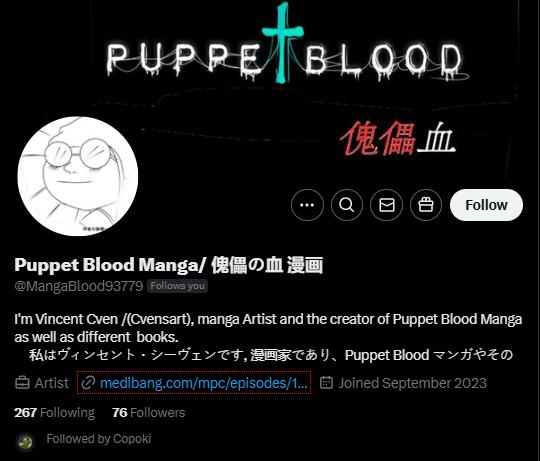
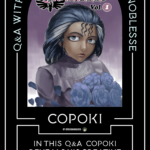

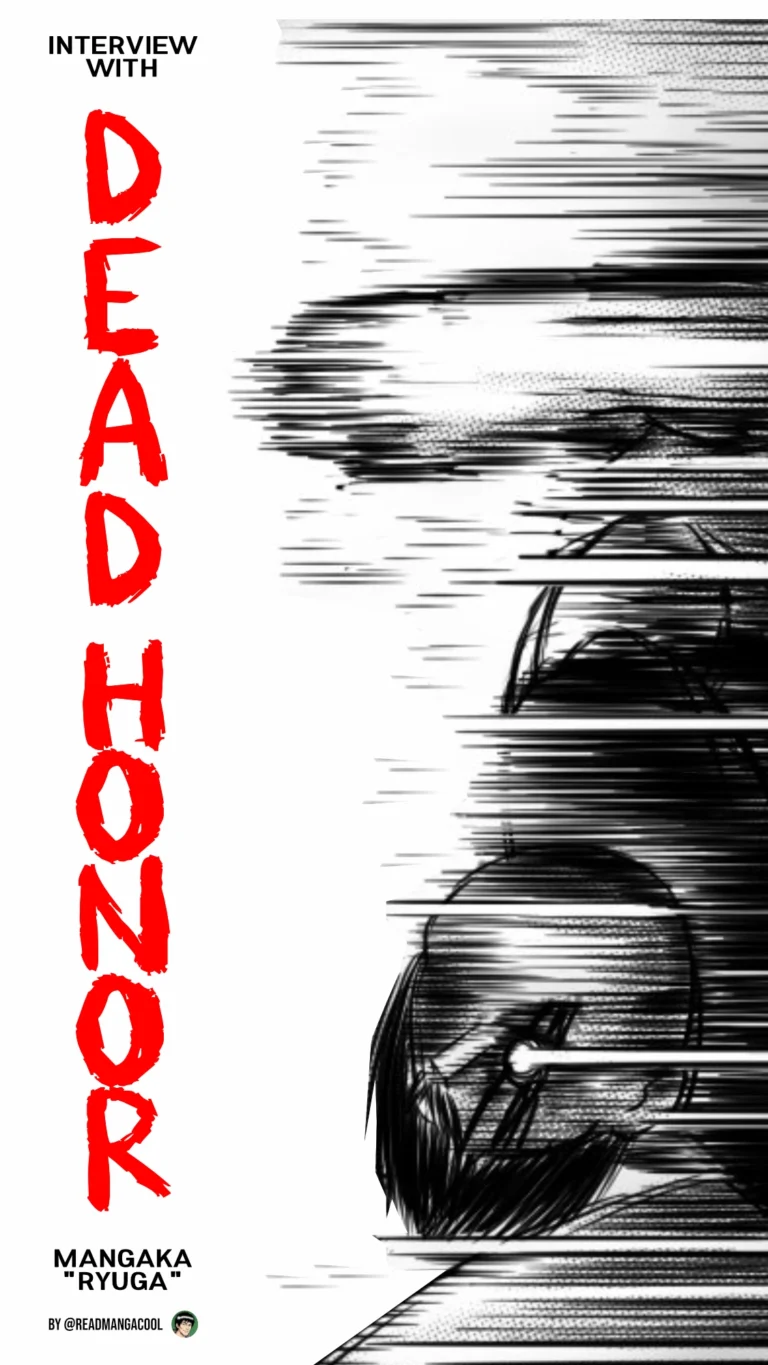

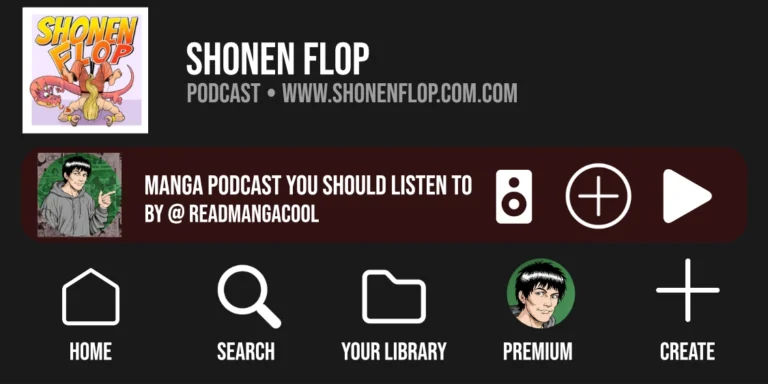
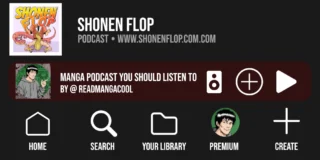
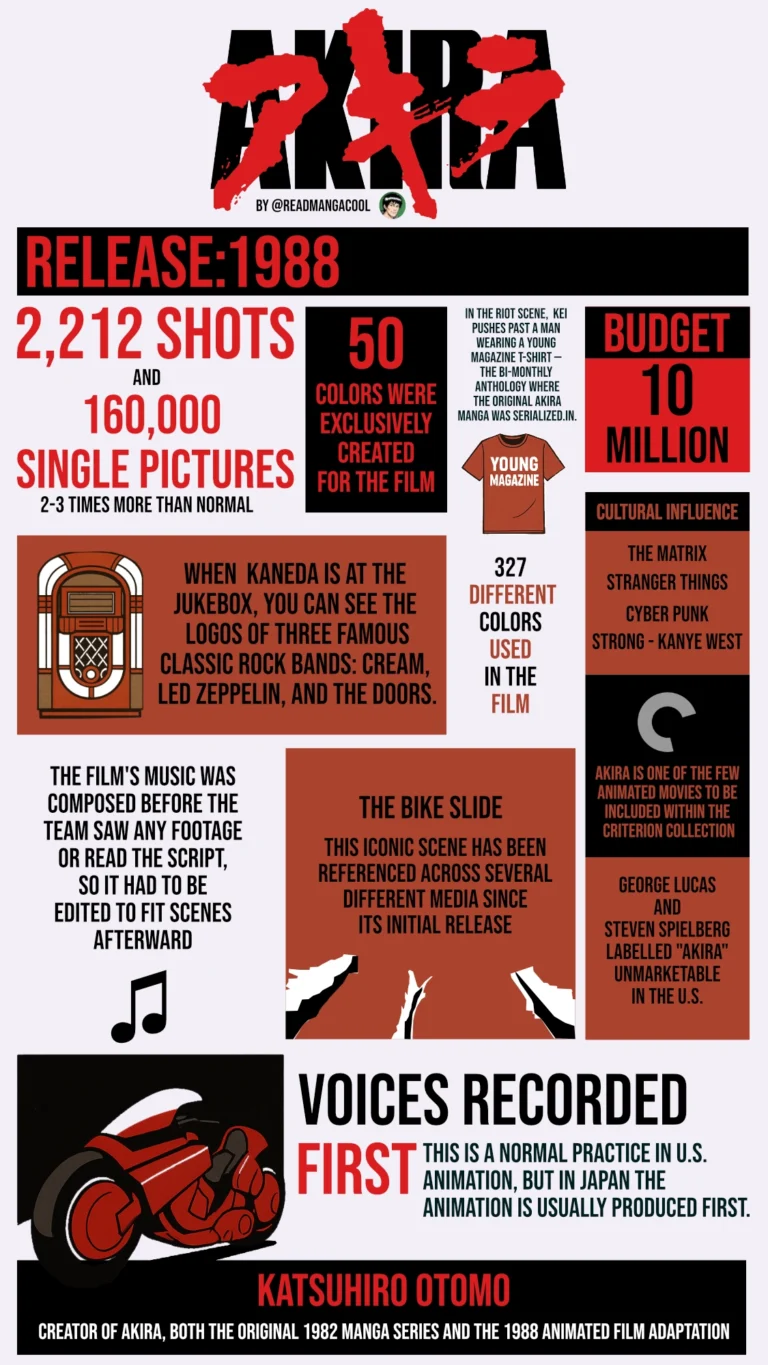
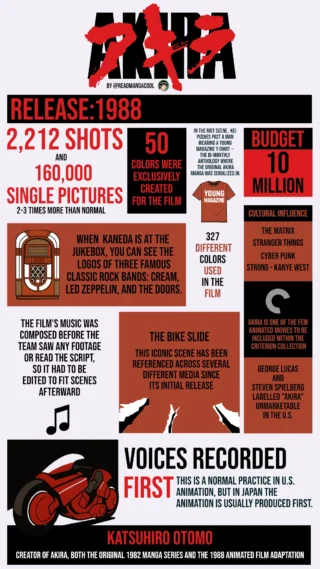


Leave a Comment